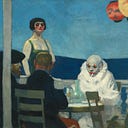My favorite Zen koan is one involving a professor and a Zen master:
Once, a university professor went to visit a well-respected Zen master to learn about Zen. The master first invited him to sit for a cup of tea. The professor sat down and started talking about Zen. The master quietly prepared and poured the tea. As he poured, the professor’s cup became full, but the master kept on pouring. As the professor watched the cup overflow, he could no longer contain himself and said, “It is overfull. No more will go in!”
The master turned to the professor and said, “Like the cup, you are too full of your own opinions and speculations. How can I show you Zen unless you first empty your cup?
We are the professor. We know so much about everything and yet our cups are full. With our cups full, we are unable to recognize anything about the true nature of existence, in fact it is passing us by every moment.
I recognized this very viscerally a few years ago when I started to tire of most news outlets, documentaries and inspirational talks. There was a moment in which I felt that I was watching and reading not in order to learn but to distract from something more profound.
The inverse of knowing is not knowing. Most of us may associate this with being curious intellectually, which is beneficial. In the context of meditation or contemplation, however, not knowing means being genuinely open to your experience and the nature of consciousness. Not thinking about it, but looking at it directly.
For those interested in emptying their cups, one contemporary master who articulates this possibility and practice as good as any other is Peter Ralston in his book The Book of Not Knowing.
